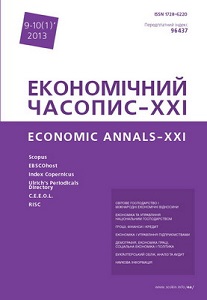FORMATION OF COUNTRY’S ECONOMIC MODEL IN CONDITIONS OF MODERN INNOVATIVE-INFORMATIONAL IMPERATIVE
FORMATION OF COUNTRY’S ECONOMIC MODEL IN CONDITIONS OF MODERN INNOVATIVE-INFORMATIONAL IMPERATIVE
Author(s): Nadiya Matviychuk-Soskina, Oleg SoskinSubject(s): Economy
Published by: Institute of Society Transformation
Keywords: innovative-informational imperative; economic model; technological mode; chaos; national capitalism; alternative energy; law-carbon economy
Summary/Abstract: Introduction. In conditions of uncontrollable horizontal chaos fuelled and promoted within the informational nets and linkages, the innovative-informational imperative of economics may be developed on creative, destructive, zero or ground mainstreams of chaos. Results. In the research innovative-informational imperative vectors basing on creative and destructive mainstreams of chaos in the age of informational society with technological revolution and ecological challenges are specified.The choice of imperative’s vector is an important precondition for future states’ economic model forming in the period of the state’s economic and technological transition to the sixth technological mode.The authors have educed the types of energy sources in the economies as those with a direct influence on the economic model of capitalism in different states.Peculiarities of various energy usage in the EU and other regions of the world from the position of green, law-carbon, sustainable economics development on the informational base, which represents a creative mainstream in conditions of chaos, are analysed, and the vectors for further changes in favour of such economic model realization are promoted.The direction of such approach introduction in Ukraine is shown. It is concluded that the national capitalism model needs conscious differentiation and qualitative evaluation of innovative technologies introduced in society in order of basic values preservation together with successful change of the technological mode
Journal: Економічний часопис - ХХІ
- Issue Year: 133/2013
- Issue No: 09+10 (1)
- Page Range: 18-22
- Page Count: 5
- Language: English

